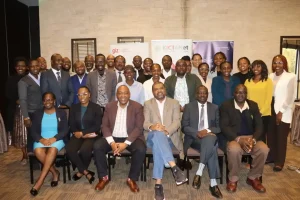We have heard of so so many students & kenyans ideas – being taken up by
others due to the original owner’s ignorance or lack of knowledge !!
Maybe its time to hold workshops in universities & incubators and other
such places to educate potential entrepreneurs of – what to look out for in
contracts and which office to seek guidance should there be a breach or
something.
On Tuesday, June 4, 2019, Patrick A. M. Maina via kictanet <
kictanet@lists.kictanet.or.ke> wrote:
> Hi Erick,
>
> Which organization is doing this?
>
> Is there a website that people can visit for more details?
>
> How does the UK visa come into play? Is there a bootcamp in UK or
> something like that? Where are the details + past bootcamps?
>
> How many startups are you looking to invest in? What is the range of
> investment amount? What kind of deal (debt, equity or convertible notes?)
>
> Do you have a portfolio of startups that founders can contact to get
> independent info about the program?
>
> Can you share your list of succesful investments, exits and big wins,
> including the duration under your portfolio?
>
> What are the T&Cs and do they contain robust features (like
> non-disclosure, non-circumvent & non-compete provisions) to protect our
> hopeful enterpreneurs / youth from the risk of losing trade secrets and
> intellectual property that would be critical to their competitiveness and
> long-term survival?
>
> I’m asking the above on behalf of inexperienced founders because there
> have been numerous cases in the past (in other platforms/fora) where
> “investors” call for pitches but in reality they are exploiting our policy
> vacuum to mine for ideas from our hopeful – but sometimes gullible –
> founders, which they ultimately pass on / sell to other startups (or to
> “partner” corporations) to avoid R&D costs.
>
> GENERAL REMARKS (FROM A POLICY-GAP PERSPECTIVE)
>
> Dear Listers,
>
> While a “bounty” approach is often pitched to corporations / investors as
> a smart “cost saving” measure, it is, in reality, an economically
> destructive, ruthless, and inhumane form of intellectual property transfer
> because it relies on trickery and false hope to achieve unpublished
> agendas. It demoralizes our youth and stifles innovation by unfairly
> misallocating opportunity/reward to the undeserving, whose only advantage
> is their connection to capital gatekeepers.
>
> Bounty programs pervert the idea of enterpreneurship, turning it into an
> unregulated GAMBLING affair, where for every one “jackpot winner” there are
> thousands of “losers” who discover that they handed over their IP to future
> competitors for FREE, and who are not protected from unfair future
> sale/exploitation of their mined IP.
>
> Such programs have led to the rise to serial pitchers, a type of gambler
> who plays for the bounty, instead of real enterpreneurs who truly want to
> solve real problems. This has resulted in the rise of “shiny object”
> enterpreneurship that focuses on impressing ponzi-style investors rather
> creating value to society. More so when they predate on poor countries,
> where REAL opportunities are scarce and desperately needed.
>
> It is unfortunate that ICT regulators have not yet recognized the real
> cost of such losses in terms of wealth transfer and destruction of jobs /
> opportunities. How do you create jobs without sources of sustainable
> advantage?
>
> In a recent media interview, I heard CISCO’s CEO say something very
> powerful when discussing Huawei. He said that if the US didn’t care about
> IP, it would be a “third world country”, because third world countries only
> focus on raw materials instead of innovations. Intellectual property is
> highly valued in developed economies. Paradoxically, poor countries tend to
> adopt policies that sustain poverty.
>
> These general comments are not meant to cast shade on Erick’s initiatives
> as I have no information to draw any objective conclusions, so I hope my
> motives will not be misunderstood. I have been consistent on highlighting
> IP mining risks in the past on this and other forums.
>
> Without clear policies and rules, there is no telling what/who is really
> genuine, and our enterpreneurs remain vulnerabe to predation from within
> and from without. Our “wild wild west”, “every man for himself” business
> landscape makes it difficult even for the genuine investors to get high
> quality, diverse pitches because of low trust levels (everyone loses).
>
> It’s sad to see our Universities and innovative MSMEs struggling to get
> funding yet they are sitting on billions of shillings in intellectual
> capital.
>
> Hoping the Competition Authority and the Trade, Labor, Education & ICT
> ministries can team up with stakeholders (not just corporate reps who have
> a conflict of interest because they fear innovation, but also academia,
> independent innovators, enterpreneurs and MSME reps) to solve this at
> policy level. If you need ideas or help in architecting this, feel free to
> onboard me.
>
> Economic prosperity doesn’t just happen on its own, or with ad-hoc “spray
> and pray” policies. It has to deliberately planned for, designed and
> implemented.
>
> Good evening,
>
> Patrick.
>
> Patrick A. M. Maina
> [Cross-domain Innovator | Independent Public Policy Analyst – Indigenous
> Innovations]
>
>
>
> On Tuesday, June 4, 2019, 2:15:08 PM GMT+3, Erick Mwangi via kictanet <
> kictanet@lists.kictanet.or.ke> wrote:
>
>
> Listers,
>
> I am looking for start-ups who fit the below criteria.
> *Investment focus*
>
> We invest broadly in tech for good, but we are particularly interested in
> startups that address the following challenges:
>
> – Affordable, accessible health and social care
> – Effective education and employability
> – Climate change, resource efficiency and conservation of the
> environment
> – Civic participation, maintenance and advancement of democracy
> – Empowering vulnerable young people, improving health and wellbeing
> and giving them the tools to thrive
> – Pro-worker innovation for the low-wage economy, solutions that
> increase bargaining power, boost pay and curb work insecurity
>
> *Investment criteria*
>
> At the accelerator stage we select teams based on:
>
> *The team*
>
> – A talented team (more than 1 person) of diverse founders with a
> strong commitment to a shared vision and mission
> – A strong understanding of the problem and the market they will be
> operating in
> – Technical experience within the team
>
> *The idea*
>
> – An innovative idea with some evidence of its merits and how it would
> solve the problem
> – A clear hypothesis of how to produce, sell and distribute the
> solution
>
> *The potential for impact*
>
> – A strong ambition to scale and positively impact millions of lives.
>
> We will provide early stage seed funding as well as apply on your behalf a
> “start-up visa” to come to the UK for 3-6months.
>
> If thats you, please reach me directly with your pitch deck.
>
> Best Wishes,
>
> E Njoroge Mwangi
> Technology| FINTECH | Big Data
>
> Cell +44 7539372742
> Skype: Erick.mwangi
>
>
> On Sun, Jun 2, 2019 at 1:40 PM Lydia gachungi via kictanet <
> kictanet@lists.kictanet.or.ke> wrote:
>
> Listers,
>
> Anyone with an idea of an individual / private sector in Eastern Africa
> using digital solutions to create impact in the culture industry/ Artistic
> Freedom (film, music, events, broadcasting, webcasting, anything in that
> sector)?
>
> Please inbox me
>
> Lydia Gachungi
> UNESCO Liaison Office to AU and UNECA
>
> _______________________________________________
> kictanet mailing list
> kictanet@lists.kictanet.or.ke
> lists.kictanet.or.ke/mailman/listinfo/kictanet
> Twitter: http://twitter.com/kictanet
> Facebook: www.facebook.com/KICTANet/
>
> Unsubscribe or change your options at lists.kictanet.or.ke/
> mailman/options/kictanet/erick.mwangi%40gmail.com
>
> The Kenya ICT Action Network (KICTANet) is a multi-stakeholder platform
> for people and institutions interested and involved in ICT policy and
> regulation. The network aims to act as a catalyst for reform in the ICT
> sector in support of the national aim of ICT enabled growth and development.
>
> KICTANetiquette : Adhere to the same standards of acceptable behaviors
> online that you follow in real life: respect people’s times and bandwidth,
> share knowledge, don’t flame or abuse or personalize, respect privacy, do
> not spam, do not market your wares or qualifications.
>
> _______________________________________________
> kictanet mailing list
> kictanet@lists.kictanet.or.ke
> lists.kictanet.or.ke/mailman/listinfo/kictanet
> Twitter: http://twitter.com/kictanet
> Facebook: www.facebook.com/KICTANet/
>
> Unsubscribe or change your options at lists.kictanet.or.ke/
> mailman/options/kictanet/pmaina2000%40yahoo.com
>
> The Kenya ICT Action Network (KICTANet) is a multi-stakeholder platform
> for people and institutions interested and involved in ICT policy and
> regulation. The network aims to act as a catalyst for reform in the ICT
> sector in support of the national aim of ICT enabled growth and development.
>
> KICTANetiquette : Adhere to the same standards of acceptable behaviors
> online that you follow in real life: respect people’s times and bandwidth,
> share knowledge, don’t flame or abuse or personalize, respect privacy, do
> not spam, do not market your wares or qualifications.
>



